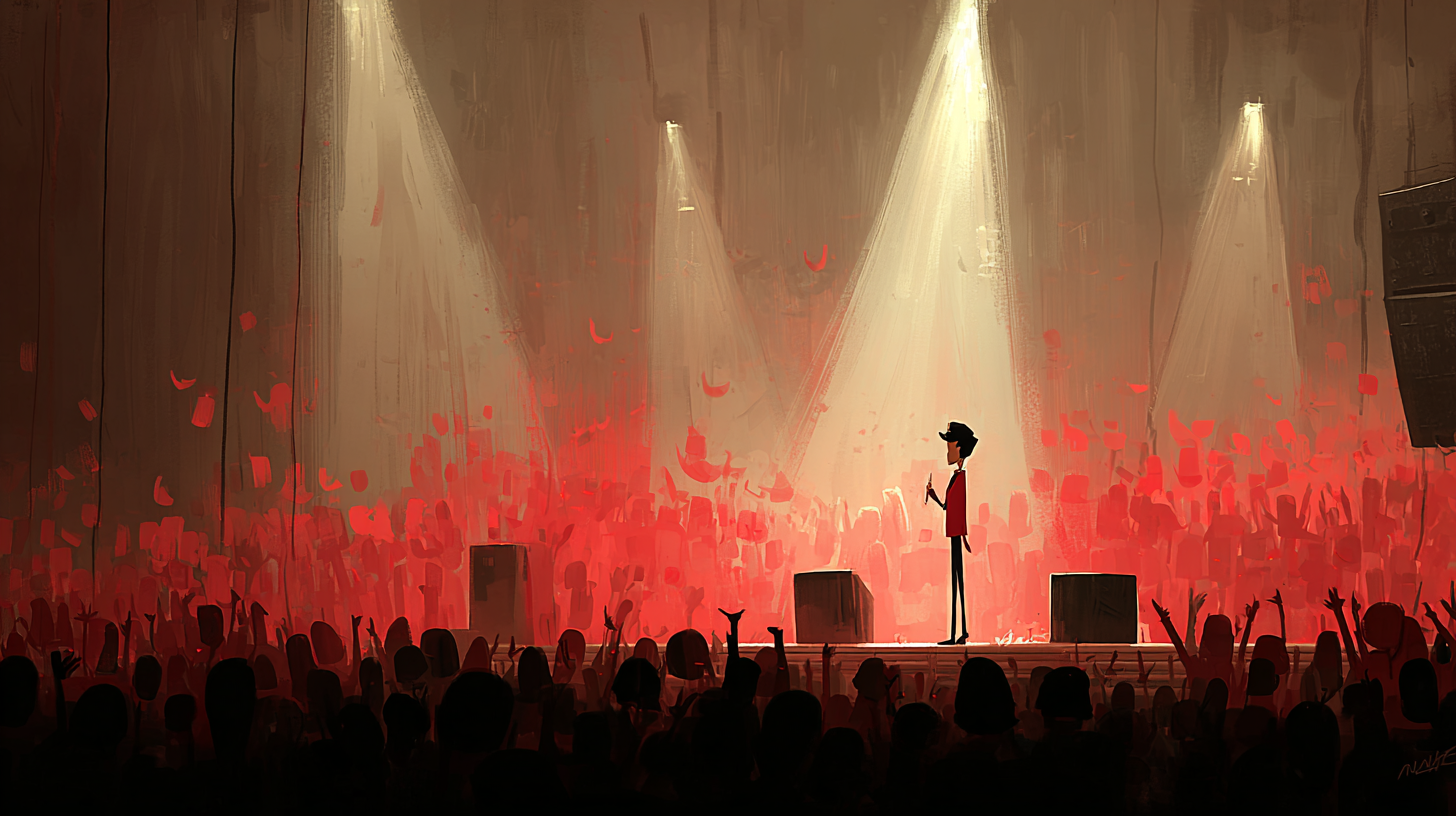“Fashion” means style, way of doing, or to make something.
「fashion」は「流行」や「やり方」、または「作る」という意味の言葉
以下は英単語 “fashion” に関するストーリー型学習コンテンツです。まずは大枠の意味を理解して最後の文章で確認しましょう。
主な意味(main meaning)
| 品詞 | 発音記号 | 意味(簡潔) | 例文 |
|---|---|---|---|
| 名詞 | /ˈfæʃən/ | 流行、服装のスタイル | Fashion changes every season. |
| 名詞 | /ˈfæʃən/ | 方法、やり方 | He solved the problem in his own fashion. |
| 動詞 | /ˈfæʃən/ | 形作る、作り上げる | The artist fashioned a statue from clay. |
語源(etymology)
「fashion」はラテン語 facere(「作る」)から派生し、古フランス語 façon(「形」「やり方」)を経て英語に入りました。
核イメージは「形づけること、スタイル」です。
類義語(synonyms)
| 類義語 | 意味 | 例文 |
|---|---|---|
| style | スタイル | Her style is simple but elegant. |
| trend | 流行 | The new trend is to wear eco-friendly clothes. |
| custom | 習慣 | It is their custom to greet guests with tea. |
| design | デザイン | The design of this dress is very unique. |
反義語(antonyms)
| 反義語 | 意味 | 例文 |
|---|---|---|
| tradition | 伝統 | The village keeps its old tradition instead of following fashion. |
| disorder | 無秩序、乱れ | His room was in total disorder, not in any fashion. |
コロケーション(collocations)
| コロケーション | 例文 |
|---|---|
| fashion industry | She wants to work in the fashion industry. |
| fashion show | The fashion show was held in Paris. |
| fashion magazine | He reads a fashion magazine every month. |
| follow fashion | Some people always follow fashion. |
| out of fashion | That old hat is out of fashion now. |
2項表現(binomials)
| 2項表現 | 例文 |
|---|---|
| fashion and style | Fashion and style are important in modern society. |
| form and fashion | He did everything in proper form and fashion. |
英語ストーリー(english story)
Story: “The New Fashion Show”
Tom worked at a small clothing shop in Tokyo. He loved clothes and always read the latest fashion magazine. He often dreamed about joining the fashion industry, but he thought it was too difficult.
One day, his manager asked him, “Tom, would you like to help prepare for a fashion show next month?” Tom was surprised. “Really? Me?” he asked. His manager smiled, “Yes, you have good taste. I think you should try.”
From that day, Tom worked very hard. He helped to fashion new clothes by arranging accessories and suggesting designs. He also studied the new trends to understand what was popular. Some of his friends always tried to follow fashion, but Tom wanted to create something different.
One night, while talking with his grandmother, she said, “Tom, in our family, we always respected tradition. But you should also find your own way.” Tom thought about her words. He realized that fashion and style were not only about clothes, but also about expressing who you are.
On the day of the show, Tom felt nervous. The hall was full of people, and a famous fashion magazine journalist was there. When the models walked out in Tom’s designs, everyone clapped. His manager whispered, “You see, your fashion is unique.”
After the show, the journalist came to Tom and said, “Your work is very fresh. You don’t just follow fashion, you create it.” Tom smiled. At that moment, he knew he wanted to stay in the fashion world forever.
Tom’s story shows that form and fashion are important, but true style comes from inside.
和訳
ストーリー和訳
トムは東京の小さな洋服店で働いていました。彼は服が大好きで、いつも最新の**fashion magazine(ファッション雑誌)を読んでいました。彼はいつもfashion industry(ファッション業界)**に入りたいと夢見ていましたが、それは難しいと思っていました。
ある日、店長がトムに言いました。「トム、来月の**fashion show(ファッションショー)**の準備を手伝ってくれないか?」
トムは驚きました。「本当に?僕が?」と聞くと、店長は笑顔で「そうだ、君はセンスがいい。挑戦してみるべきだと思うよ」と言いました。
その日からトムは一生懸命働きました。彼はアクセサリーを組み合わせたり、**design(デザイン)を提案したりして新しい服をfashion(形作る)しました。また、何が人気かを知るために新しいtrend(流行)も勉強しました。彼の友達の中にはいつもfollow fashion(流行を追う)**人もいましたが、トムは違うものを作りたかったのです。
ある晩、祖母と話していると、祖母は言いました。「トム、私たちの家族はいつも**tradition(伝統)を大切にしてきた。でも、あなたは自分の道を見つけるべきだよ。」トムはその言葉を考えました。彼はfashion and style(流行とスタイル)**は服だけでなく、自分自身を表現することだと気づきました。
ショーの日、トムは緊張していました。会場は人でいっぱいで、有名な**fashion magazine(ファッション雑誌)**の記者も来ていました。モデルたちがトムのデザインの服を着て歩くと、観客は拍手をしました。店長がささやきました。「見ただろう、君のファッションは独自のものだよ。」
ショーの後、記者がトムに言いました。「あなたの作品はとても新しい。単に**follow fashion(流行を追う)**のではなく、あなた自身が作っているのですね。」トムは笑いました。その瞬間、彼はずっとファッションの世界にいたいと確信しました。
トムの物語は、**form and fashion(形式と流行)**が大切だが、本当のスタイルは内面から生まれることを示しています。
Q&A
Q: 「fashion」と「style」の違いは?
A: 「fashion」は社会全体の「流行」を表すのに対し、「style」は個人の好みや特徴的な「スタイル」を指します。例えば、ある人の「style」は変わらなくても、「fashion」は季節ごとに変わります。
Q: 「fashion」と「trend」の違いは?
A: 「trend」は一時的で短期間の流行を意味することが多いです。「fashion」はより広い意味での流行全般を指し、文化や産業としての要素も含みます。
Q: 「fashion」と「custom」の違いは?
A: 「fashion」は一時的・時代ごとの「流行」ですが、「custom」は長い間続いてきた「習慣」です。たとえば「浴衣を夏に着る」はcustom(習慣)ですが、「今人気のブランドバッグを持つ」はfashion(流行)です。
Q: 「fashion」と「design」の違いは?
A: 「design」は物の形や機能を考えて作り出す「設計」や「意匠」を意味します。「fashion」はそのデザインが社会で人気になり流行することも含んでいます。つまり、「design」は作ることに重点があり、「fashion」は広がり方に重点があります。
Q: 「fashion industry」と「fashion show」の違いは?
A: 「fashion industry」は服やアクセサリーを作り、販売し、広める業界全体を指します。一方「fashion show」はその業界の成果を見せるイベントのことです。
Q: 「fashion magazine」と「fashion show」の違いは?
A: 「fashion magazine」は流行を紹介するメディアで、読者に情報を与えるものです。「fashion show」は直接モデルが服を見せて観客に体験させる場です。
Q: 「fashion」と「tradition」の違いは?
A: 「fashion」は新しく移り変わる流行を指しますが、「tradition」は昔から続いてきた変わらない習慣を指します。対比的な関係です。
Q: 「fashion」と「disorder」の違いは?
A: 「fashion」には「秩序ある形」や「きちんとした様式」という意味もありますが、「disorder」はその逆で「乱れ」や「無秩序」を意味します。



コメント